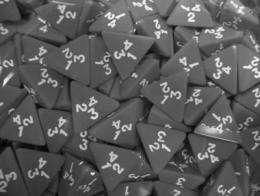Densest dice packing and computing with molecules

Physicists have made two new breakthroughs -- discovering a shape that packs more efficiently than any other known, and completing a high speed quantum calculation thousands of times faster than possible with conventional computation.
Dice Packing Record
Tetrahedral dice, which have four triangular sides, pack more densely than any other shape yet tested, according to research performed by a collaboration of New York University and Virginia Tech physicists. The revelation is the result of a series of experiments that involved pouring tetrahedral dice into containers, shaking them, and adding more dice until the containers were completely filled. After adding water to measure the open space between the dice, the researchers confirmed that the tetrahedrons fill roughly 76% of the available space in a large container. Similar experiments with spheres typically only fill containers to about 64% of the total volume. The researchers were able to get an inside view of the packed tetrahedral dice by imaging the containers with an MRI machine. The images are vital in helping them check and refine their die packing models.
The experiment, which is reported in the May 3 issue of Physical Review Letters, confirms recent calculations predicting efficient packing. Such packing problems are related to understanding many other problems including liquids seeping through soils, the flow of granular materials like sand and gravel, dense storage of information in digital memory, and even determining the best shapes for packaging consumer products like medicine tablets and candies. Daan Frankel of the University of Cambridge discusses the tetrahedral packing experiment and related research in a Viewpoint article appearing in the current edition of APS Physics.
Molecular Computations
An experimental demonstration of a quantum calculation has shown that a single molecule can perform operations thousands of times faster than any conventional computer. In a paper published in the May 3 issue of Physical Review Letters, researchers in Japan describe a proof-of-principle calculation they performed with an iodine molecule. The calculation involved that computation of a discrete Fourier transform, a common algorithm that's particularly handy for analyzing certain types of signals.
Although the calculation was extraordinary swift, the methods for handling and manipulating the iodine molecule are complex and challenging. In addition, it's not entirely clear how such computational components would have to be connected to make something resembling a conventional PC. Nevertheless, in a Viewpoint in the current edition of APS Physics, Ian Walmsley (University of Oxford) points out that the demonstration of such an astonishingly high-speed calculation shows that there is a great deal to be gained if physicists can overcome the difficulties in putting single-molecule computation to practical use.
More information:
-- Experiments on the Random Packing of Tetrahedral Dice, Alexander Jaoshvili, Andria Esakia, Massimo Porrati, and Paul M. Chaikin, Phys. Rev. Lett. 104, 185501 (2010) - Published May 03, 2010, Download PDF (free)
-- Ultrafast Fourier Transform with a Femtosecond-Laser-Driven Molecule, Kouichi Hosaka, Hiroyuki Shimada, Hisashi Chiba, Hiroyuki Katsuki, Yoshiaki Teranishi, Yukiyoshi Ohtsuki, and Kenji Ohmori, Phys. Rev. Lett. 104, 180501 (2010) - Published May 03, 2010. Download PDF (free)
Provided by American Physical Society


















